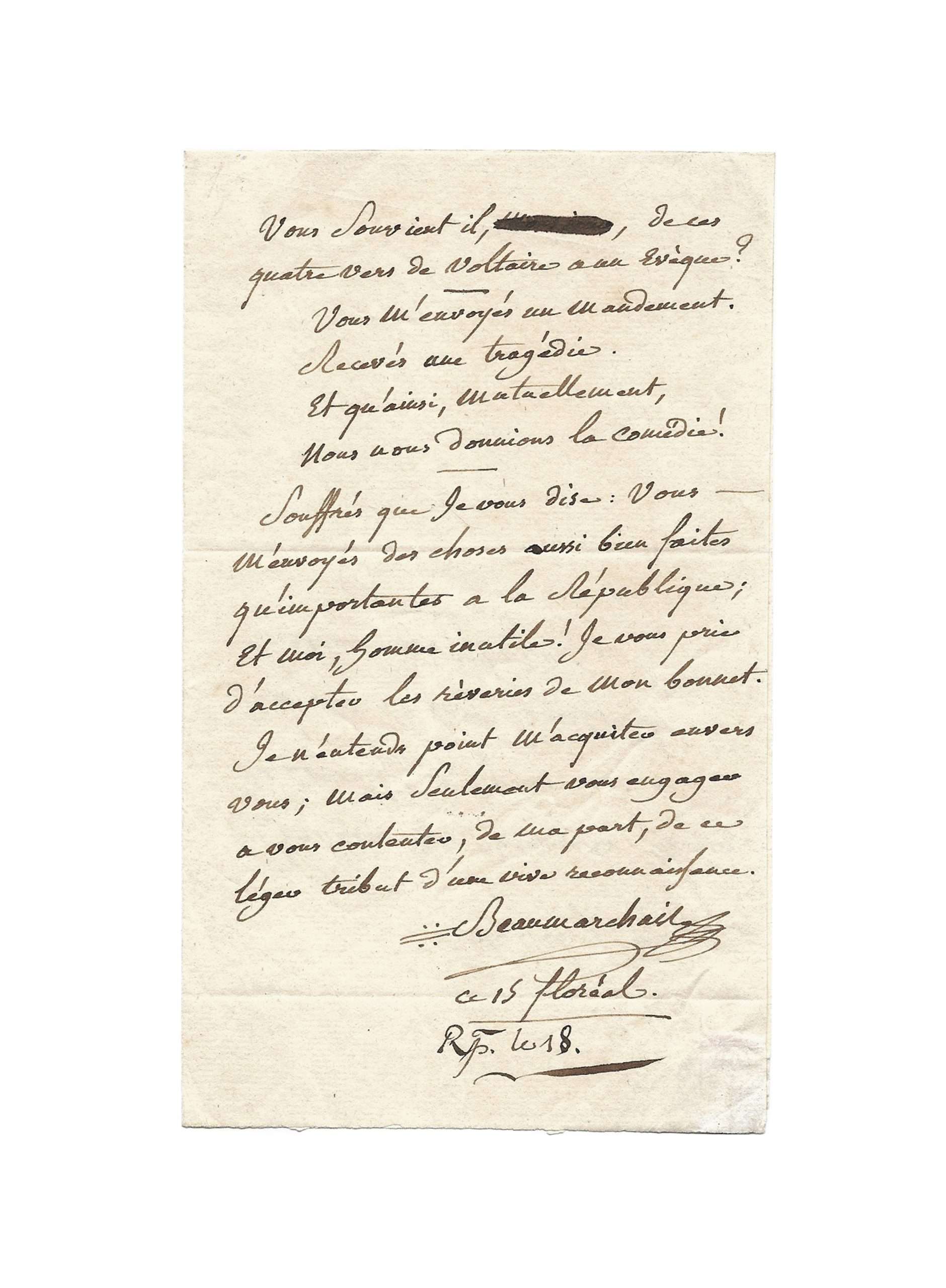BEAUMARCHAIS (de), Pierre-Augustin Caron (1732-1799)
Autograph letter signed « Beaumarchais » to Pierre-Charles-Louis Baudin
N.p, « ce 15 floréal » [4th May 1797], 1 p. small in-8°
« And I, a useless man! I beg you to accept the dreams of my hat »
Fact sheet
BEAUMARCHAIS (de), Pierre-Augustin Caron (1732-1799)
Autograph letter signed « Beaumarchais » to Citizen Pierre-Charles-Louis Baudin
N.p, « ce 15 floréal » [4th May 1797], 1 p. small in-8°
Apostille « Rép[ondu] le 18 [floréal] » from the hand of Pierre-Charles-Louis Baudin
One word “Monsieur” crossed off by Beaumarchais
Quoting Voltaire, Beaumarchais sent his correspondent La Mère coupable, the third part of his Figaro Trilogy
« Vous Souvient il, Monsieur, de ces quatre vers de Voltaire à un Evèque ?
–
Vous m’envoyés un mandement.
Recevés une tragédie.
Et qu’ainsi, mutuellement,
Nous nous donnions la comédie !
–
Souffrés que je vous dise : Vous m’envoyés des choses aussi bien faites qu’importantes à la République ; Et moi, homme inutile ! Je vous prie d’accepter les rèveries de mon bonnet.
Je n’entends point m’acquiter auvers vous ; mais seulement vous engager a vous contenter, de ma part, de ce léger tribut d’une vive reconnaissance.
Beaumarchais
ce 15 floréal »
[« Rep. Le 18 »]
This letter is part of a sequence of epistolary exchanges between Beaumarchais and Pierre-Charles-Louis Baudin. We know Baudin’s reply to the “18 floréal”, as indicated by him in the lower margin: “My political abortions cannot become the equivalent of your dramatic work. As I read it with avidity, I perfectly felt how necessary Susanne’s bottle was. Your Irishman suffocates me […] however, observed that on the one hand political fanaticism as well as religious fanaticism explains many facts which seem to exceed the known measure of human wickedness; that, on the other hand, what we have seen that is most atrocious, most revolting, and above all most disgusting, had a character of brutal frankness, whereas in your Tartuffe it is a question of a refinement of hipocrite blackness, so managed, spun with so much art […] ». (Beaumarchais et le Courrier de l’Europe. Ed. Gunnar & Mavis von Proschwitz. Studies on Voltaire and the Eighteenth Century. Oxford : The Voltaire Foundation, 1990 ; p. 1173-1174, n°628).
When Baudin evokes the characters “Irish” [Bégearss], “Suzanne” [Figaro’s wife] and more broadly the praise he makes of the theatrical drama of his correspondent, we understand that the text sent by Beaumarchais is the third part of his Spanish [Figaro] trilogy: The Guilty Mother.
The play, performed on 26 June 1792 at the Théâtre du Marais, was a failure. The revival, at the Théâtre de la rue Feydeau, on 16 Floréal of the year V (5 May 1797), that is to say the day after this letter, was this time crowned with great success. The play represents the third part of the Figaro trilogy, after The Barber of Seville (1775) and The Marriage of Figaro (1778). Beaumarchais himself wrote a notice to comment on this third and final act: “After having laughed at the Barber of Seville at the turbulent youth of Count Almaviva, after having gaily considered in the Mad Day [The Marriage of Figaro] the faults of his virile age, come and convince yourself, by the picture of his old age, that every man who is not born, a dreadful villain always ends up being good. »
Although no letter between Voltaire and Beaumarchais has come down to us today, we nevertheless know the esteem in which they were held. In his book, Voltaire’s Kehl Edition. L’édition Kehl de Voltaire. Une aventure éditoriale et littéraire au tournant des Lumières, Linda Gil explains that “Their relationship is built on mutual admiration. Beaumarchais read Voltaire and admired his works. His own writing is often influenced by the style of the philosopher. As for Voltaire, “he cites Beaumarchais as an example to D’Alembert, he compares himself to him. A good part of his correspondence from the first months of 1774 is occupied with it.”
Provenance:
Vente Cornuau, 25-26 mai 1934
A. Guichard Collection
Bibliography:
« Chroniques », Revue d’histoire littéraire de la France, 42e année, n°1 (1935), p. 148 (transcription partielle) – Linda Gil, L’édition Kehl de Voltaire. Une aventure éditoriale et littéraire au tournant des Lumières, Honoré Champion, Paris, 2018, t. 1, p. 573-576 – Inventaire numérique de la correspondance de Beaumarchais, Linda Gil (dir.), Humanum/IRCL, IDC24
